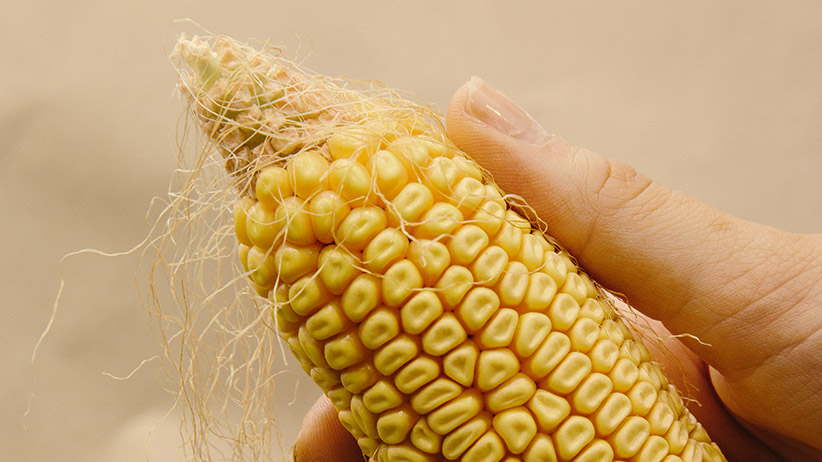
Monsanto GMO corn. Photo via Daniel Shea
Sales of organic food have risen every year since 2005, culminating in a total of about $57.5 billion from 2020-2021.
Despite this positive trend, non-organic food is still sold far more often in the United States.
What was once taboo, the genetic modification of our grains and other food crops in a laboratory to withstand large doses of toxic herbicides, has now become commonplace.
Genetically modified corn, soybeans, sugar beets, and canola are more than 90% genetically modified on average each year, meaning that millions of people are being exposed to foreign proteins and synthetic pesticides in their food.
In 2021, the non-profit GMO Free USA released a database of studies showing the potential dangers of GMO foods, which can be found by clicking on this link.
Now, the GMO industry is in the news again — and this time, its potential effects on causing leaky gut and other digestive symptoms is in focus.
On February 3, 2022, GMO Free USA shared information about a study that has long been forgotten in the public consciousness.
This particular study was undertaken by Australian researchers in 2018, studying the effects of Monsanto’s (now Bayer) GMO corn on the stomachs of lab animals.
The researchers fed a “triple-stacked GM maize engineered for insect resistance and herbicide tolerance,” according to the paper, which was peer-reviewed.
Study Finds GMO-Fed Rats Had Leaky Gut Syndromes, ‘Debris’ in Stomach Lining Cells

Two groups of rats were split into groups of 10 males each.
One group was fed GMO corn producing Bt pesticides within the plant, and the other was GMO and glyphosate-tolerant.
The Bt corn also contains ‘Cry proteins,’ which are foreign to the body and contained within GMO corn products.
The feeding study last six months – twice the length of a typical rat feeding study used for government approval.
The other group was fed a commercially-grown non-GMO corn grown in Australia.
According to regulatory approval of GMO corn, these three varieties have been deemed “functionally equivalent” to each other, which was the basis of their approval without long-term safety testing.
***
So, the two groups of rats had similar reactions to the GMO and Non-GMO corn, right?
Wrong, according to the study’s results.
***
Researchers found that the rats fed GMO corn had “gaps in their tight (stomach) junctions,” which are described as “any two cells that line the stomach and are held tight against each other to prevent viruses, bacteria, or food particles from leaking out from the stomach into the tissues of the body.”
These gaps are called “poor apposition.”
On average, this health-damaging phenomenon was found at five times greater in rats fed the GMO corn diet.
The researchers called for more experiments to be conducted to determine potential negative side effects of this problem.
“Poor apposition should not occur in normal, healthy stomachs,” wrote GMWatch.org in an article on the study.
“Yet every stomach section in rats fed the GM diet had these gaps between a number of cells.
“Seventy percent of the GM-fed rats had at least 30% of their tight junctions poorly apposed, compared to no rats on the non-GM diet.
“The risk of a rat having 30% or more of its tight junctions poorly apposed was more than 7 times higher if the rat was fed the GM diet.”
Changes were also shown in the stomach lining of rats that consumed GMO grains.
Rats fed a GMO-based diet had larger, more swollen stomach-acid producing glands, which help to digest food.
The glands in the GMO-fed group also often contained debris or mucus, and the cells lining the glands were often abnormal, in some cases stretched out or longer than they should have been.
***
“While every rat on the GM diet showed at least one gland that looked like that, none of the rats fed the non-GM diet showed this pathology,” Doctors Irena M. Zdiarski and Judy Carman, authors of the study, said.
In other words, eating products containing genetically modified corn may be one of the biggest risk factors for stomach problems, leaky gut and other digestive issues — something that mothers who started feeding their kids a non-GMO and organic diet noticed after years of chronic health issues.
***
Thanks for reading! The study can be viewed by clicking on this link. If you’d like to improve your gut health, try this apple cider vinegar blend (organic and on sale now for 85% off regular price, click here to try it).
Related Reading: Holistic Doctor Shares: These are the Top Seven Foods For Healing Leaky Gut From the Inside-Out
Thanks for installing the Bottom of every post plugin by Corey Salzano. Contact me if you need custom WordPress plugins or website design.




